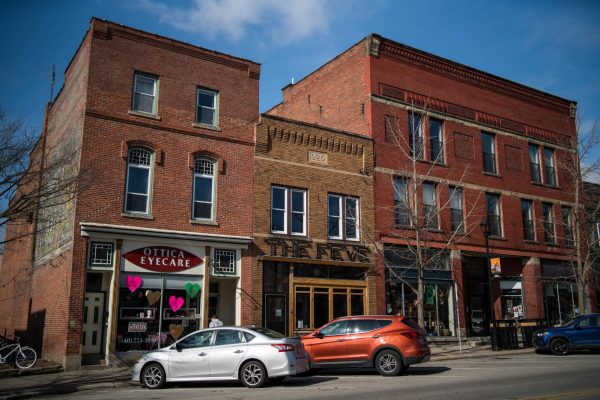Conference Brings Ideas, Array of Leaders to Oberlin
An impressive array of writers, politicians, educators, and national leaders will convene at The Hotel at Oberlin for a private conference in a couple of weeks to address contentious issues concerning the state of American democracy.
The conference, which will take place Nov. 15–17, is titled The State of American Democracy: A National Conversation and will, according to organizers, discuss solutions for rebuilding what they refer to as “the frayed edges of American democracy.”
The lengthy roster of guests features a broad range of speakers from both sides of the ideological spectrum with expertise on a wide range of contemporary issues. Among the guests listed are J. D. Vance, author of The New York Times bestselling memoir Hillbilly Elegy, former Colorado Governor Bill Ritter, academics from America’s most prestigious universities, and numerous writers for The New York Times, The New Yorker, and other publications.
David Orr, the Paul Sears distinguished professor emeritus of Environmental Studies at Oberlin College, is one of the lead organizers. The conference is the first in a series of events that will take place into 2018, which are expected to be held in Los Angeles, Denver, and Atlanta.
“It’s more like a succession of meetings that builds momentum so that it becomes more like an avalanche of ideas and energy and action,” Orr said.
Although the conference is the first of its kind Orr is hosting, he said he is hopeful for positive outlook and outcomes to emerge.
“I’m not sure what to expect,” Orr said. “I’m hoping to see a lot of great energy, a lot of great ideas, a lot of great people, a lot of smart comments. But right now, I think that the country is adrift, and I fear that the anger and anxiety that Donald Trump [encourages have] become too powerful … I’m hoping to come out of this with real momentum.”
Assistant Professor of Politics Jennifer Garcia said that although the Politics department wasn’t involved in the organization of the conference, she is excited nonetheless and supported Orr’s rationale for holding such a meeting.
“The 2016 election inspired this new interest in American politics,” Garcia said, adding that the issues the conference will focus on are extremely topical. “What are some things that can be done to make American democracy more robust and help create a democracy that can respond to the demands that we’re facing in the 21st century?”
Although the event will be held on campus, it will only be open to invited guests. Approximately 150 people are expected to attend the three-day gathering.
“It’s a closed meeting,” Orr said. “It’s just happening in Oberlin because I’m here. It’s not a college-affiliated event.”
“The State of American Democracy” is financed entirely by outside funders not connected to the College or the conference’s roughly 20 sponsoring organizations.
“The College has not put a nickel into this,” Orr said.
Although the College is not sponsoring the conference, it is expected to be a boon to Oberlin since it will be held at The Hotel.
“We spent a lot of money on The Hotel,” Orr said. “If you see The Hotel as a means to a larger end, the question is what events can we hold in The Hotel … that have the effect of directing national attention.”
Part of the original motivation for rebuilding The Hotel was to attract events like “The State of American Democracy.” This conference, the recent “Exploring Beauty and Truth in Worlds of Color,” and last year’s “After Fossil Fuels” all display the College’s strategy to host events at The Hotel to attract attention and provide an economic stimulus.
Although this convention will be private, a number of upcoming events will be open to the public, including the closing convocation talk by author and conservationist Terry Tempest Williams. Professor Marc Blecher, chair of the politics department, is also organizing three side-events featuring some of the conference participants.
Some expressed regret that students and community members will not have more access to such distinguished guests. College sophomore and Co-Chair of the Oberlin Democrats Monica Dix said she was frustrated by the admission restrictions.
“It would be great if all of these really intellectual, intelligent, educated people that are spokespeople for their fields in very real ways were accessible to students,” Dix said.
Despite her frustration, Dix conceded that overall she is glad the conference is taking place.
“It definitely should not be taken lightly that people are putting in effort to organizing around this,” she said. “I think that action is good at any level.”
Orr explained that Oberlin’s hosting role is still important to the mission and values of the College, even if students won’t be granted access.
“I think that with our history, our capacities, our music, arts, our visibility in the nation — this is the best place to kick off something like this,” Orr said. “This is a great place to start this conversation.”






